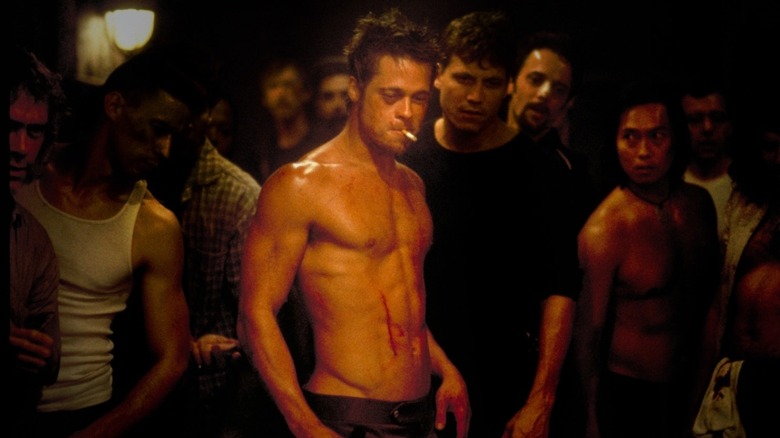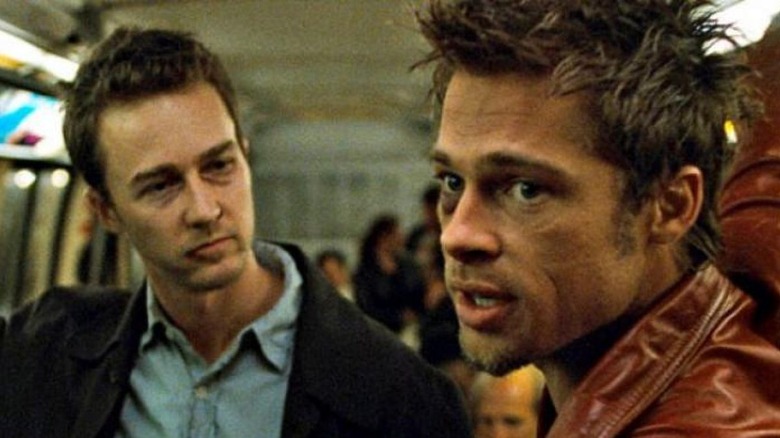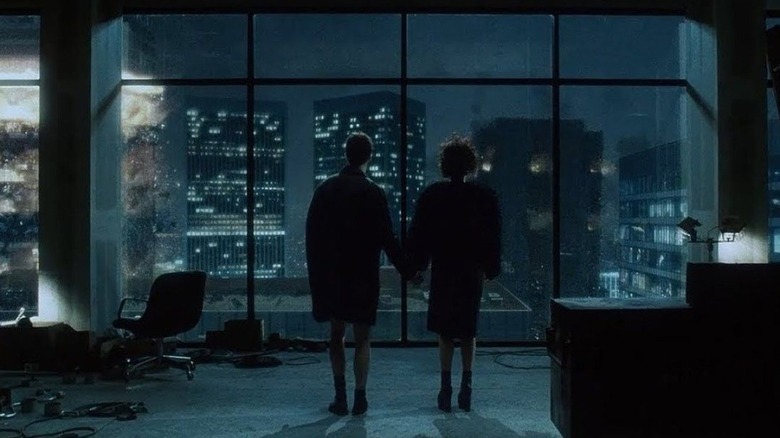Nobody Thought Fight Club Would Make It Out Of Pre-Production
"Fight Club" is David Fincher's stylistic, nuanced view on 21st-century masculinity and consumerism. The film is an adaptation of the Chuck Palahniuk novel of the same name. The scathing indictment on modern workplaces and what we're expected to do with our money was borne partly from Palahniuk's own frustration with his lot in life. He wrote the novel while completing the mundane work of writing repair manuals.
After pouring out his frustrations in the form of a pliant narrator and Gen-X antihero Tyler Durden, the story took a long and winding path to become the visual masterpiece we have today. It seemed that the first rule about fight club might have been that you don't make "Fight Club." For the longest time, it looked like the project would never make it out of pre-production. But a determined director and a cast that resonated with the film's message helped see the project to fruition.
The studio didn't know how to turn it into a movie
Following the movie's journey to get produced is a bit like trying to interpret Edward Norton's motivations in the film. According to The Ringer, before the book even hit the shelves it found its way to first-time producer Ross Grayson Bell. He was drawn to the project when he discovered the narrative's big plot twist. Bell described the moment:
"You get to the twist, and it makes you reassess everything you've just read. I was so excited; I couldn't sleep that night."
Bell recorded a table read using unknown actors and sent the recording to Fox executive Laura Ziskin. She wasn't sure how to make a movie out of it but figured someone could and optioned the rights to the book for Fox and hired Bell as a producer. Bell eventually got the book in front of director David Fincher, who loved it so much he wanted to purchase the rights himself. But there was one problem. Fincher had no desire to ever work with Fox again after a falling out years earlier over "Alien 3."
Fincher eventually acquiesced and then convinced Fox to greenlight the project in a fashion that would make Tyler Durden proud. Like a page ripped right from the book, Fincher challenged Fox to throw millions of dollars at a project he claimed would get people talking about the anti-consumerist rantings of the schizophrenic main character. The studio remarkably agreed, asking Fincher to produce a screenplay and put together a cast.
That was easier said than done for a project that everyone seemed to love but no one thought would ever get made.
Everyone kept saying 'It's never going to get made'
Even those that liked the book doubted the material could be made into a film. Fox Chairman Bill Mechanic thought the material was too dark for a movie, saying, "I thought it would never see the light of day." Fincher turned to Jim Uhls to write the screenplay, who had the same sense. Although he described the book as jaw-dropping, Uhls also thought to himself, "It will be fun to write this, but it's never going to be made."
Fincher cast Brad Pitt and Edward Norton as the analogous main characters. The trio met for weeks with screenwriter Andrew Kevin Walker, kicking around ideas and re-working the script. Pitt described the arduous task of evaluating the complex material:
"It's such a hard film to get a handle on. How do you characterize something you've never seen before?"
After months of work, Fincher delivered what he calls a "dictionary-sized package" to Fox, who approved the project for production. When the film finally arrived in theaters, its violence, complex narrative, and confusing ending led to a poor reception and box office performance. But the film has aged as well as Brad Pitt. "Fight Club" ranks as the 12th best film of all time on IMDb's Top 250 Films list. Laura Ziskin was right, someone would know exactly how to make the movie. "Fight Club" is David Fincher's enduring love letter to Gen X angst and a rebellion against the consumerist world inherited from previous generations.


